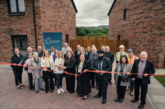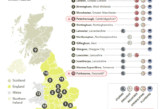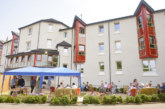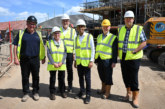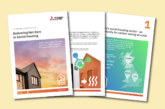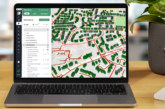Equans has been appointed by Dudley Metropolitan Borough Council (MBC) to deliver on plans for the UK’s first Net Zero Neighbourhood.
The landmark project in Brockmoor will look to tackle climate change through decarbonisation while reducing household energy bills, creating better transport links and increasing the community’s participation in making the neighbourhood cleaner and greener. The project will ultimately act as a prototype to decarbonise neighbourhoods across all seven West Midlands local authority areas.
Dudley MBC are among five local authorities within the West Midlands that have detailed plans for a Net Zero Neighbourhood. Dudley MBC and Equans’ plan was successful in securing funding from the West Midlands Combined Authority (WMCA) to pilot a solution that could be rolled out across the region and support the West Midlands ambition to be Net Zero by 2041.
The WMCA will invest £1.65m capital into Phase One of the scheme — which will eventually see a neighbourhood of up to 300 homes (a mix of privately owned and social housing properties) and associated infrastructure benefit from Net Zero measures.
Homes will undergo ‘deep retrofit’ of energy efficiency and decarbonisation measures using cutting-edge insulation with options for solar panels, batteries, and low carbon heating systems. Other measures introduced on a neighbourhood-scale could include shared bicycles, demand responsive transport, local grid trading, communal food growing initiatives, green roofs, and sustainable drainage systems.
Equans is tasked with designing and implementing zero carbon solutions, while proving a replicable finance model for greening whole neighbourhoods.
The initial concepts for a Net Zero Neighbourhood were first announced during the COP26 climate conference in Glasgow in November 2021. The Net Zero Neighbourhood demonstrator follows studies which found that to date, most initiatives have only encouraged individual households to take up deep retrofit measures and cleaner heating technologies, not whole streets; thereby failing to consider the links with the local transport and the energy system that sit around the homes themselves.
Colin Macpherson, Divisional CEO for Equans UK & Ireland said: “The energy transition, coupled with the fuel crisis and rising cost of living, means this project is more pertinent than ever.
“For the past few years, Equans has been progressing plans for town-wide energy systems that would not only revolutionise how we use energy, combatting carbon emissions, but importantly would also support in tackling fuel poverty.
“We are pleased to be working with Dudley MBC and WMCA to bring these plans to life and make a lasting impression for the community.”
Andy Street, Mayor of the West Midlands, and Chair of the West Midlands Combined Authority (WMCA), commented: “We are determined to create cleaner, greener and healthier neighbourhoods across the whole region where local people can flourish and reach their full potential.
“Our vision to achieve that is for entire neighbourhoods where homes have better insulation and low carbon heating systems, access to good quality green spaces, energy efficient street lighting, greener transport links, sustainable drainage systems and even the potential for communal food growing initiatives.
“We’re delighted to be working with Dudley MBC and Equans on this pioneering Net Zero Neighbourhood — the first to be funded by the combined authority.
“It will pave the way for the holistic approach that we need to take if we are going to make tangible improvements to the health and wellbeing of residents across the West Midlands and tackle the climate emergency at scale. I look forward to seeing the plans come to life in the months and years ahead.”
Cllr Rob Clinton, Cabinet Member for Waste management and Climate Change, added: “We’re really proud to be piloting this initiative in Dudley to lead the way in helping to tackle climate change in our homes and neighbourhoods.
“By trialling the project in a small area of the borough and putting carbon saving measures through their paces, it is hoped they can be rolled out successfully across the region.
“By getting the right partners involved from the start who have the experience in delivering similar projects elsewhere, we believe we can make this pilot a success.
“Moving forward, our priority will be to begin the engagement with local people who fall within the pilot area in the next few weeks. This will include homeowners and renters.”
The project recently commenced and will run over two years.
Header image: ©Andrii Yalanskyi/AdobeStock




